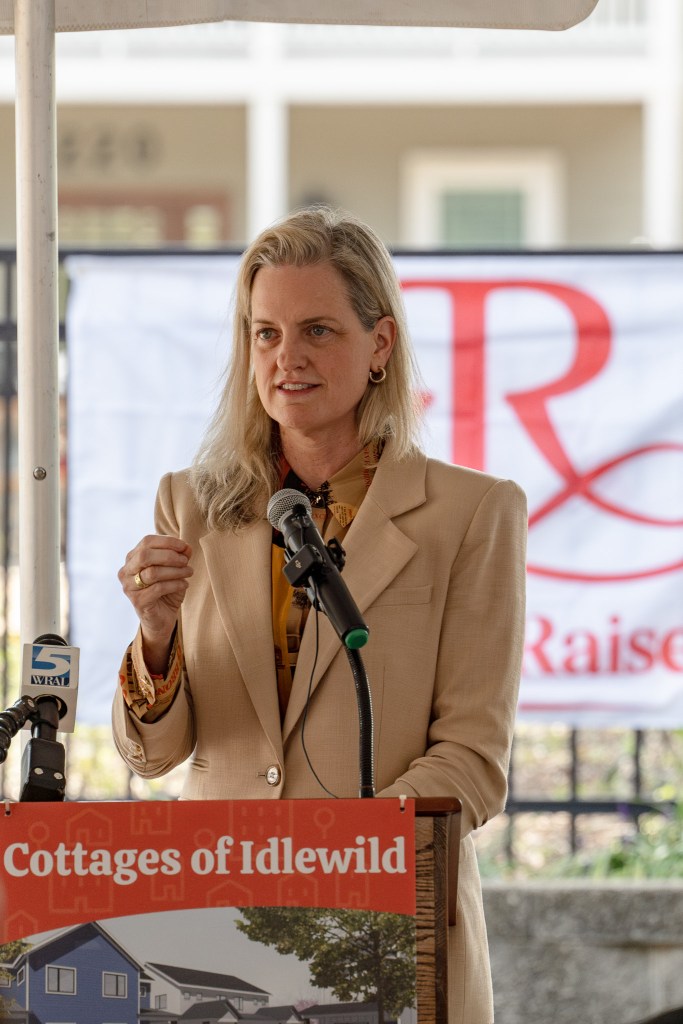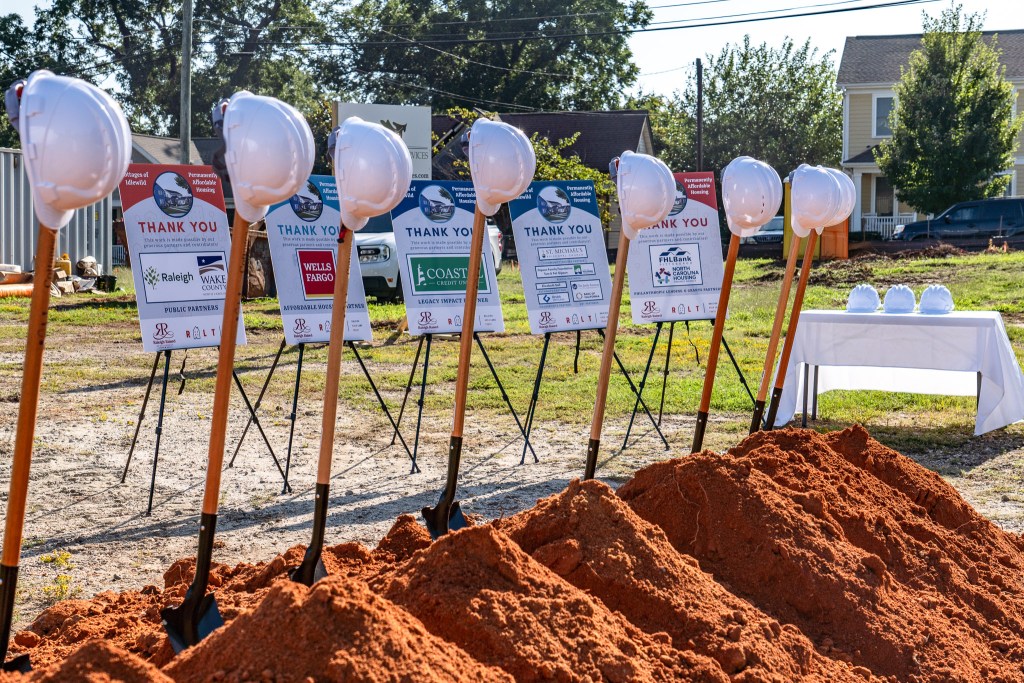North Carolina Central University’s men’s basketball coach LeVelle Moton teared up more than once as he gave a speech Monday at the groundbreaking of the Cottages of Idlewild, what will soon be an 18-home, affordably-priced cottage court development just minutes away from downtown Raleigh.
Some 200 Raleighites—Idlewild neighbors, elected officials, business and community leaders, and others—had gathered on the balmy late-August morning at Moton’s namesake park on East Lane Street, located just across the street from the future development at the corner of Idlewild Avenue.
It’s a project that’s been in the works for the historically Black neighborhood for years, and as much as it’s a win for Moton, and for Raleigh, it’s also a win for the nonprofit Raleigh Area Land Trust (RALT) that partnered with the city and Moton’s development firm, Raleigh Raised, to fundraise millions of dollars to make it a reality.
“What good is a community,” Moton asked the crowd, “if the teachers that inspired you can’t afford to live there? What good is a community if the policemen, the firemen, the EMS workers, the cafeteria workers, the bus drivers … What good is a community if they can’t afford to live there? Through this project, we’ve created a unique public and private partnership that will hopefully become a blueprint to all of those in Raleigh.”
If the Cottages of Idlewild have been in the works for a while, RALT has been working to get off the ground for just as long, or even longer. Founded in 2018 by Rhett Fussell, with support from community leaders, local philanthropists and affordable housing experts, the nonprofit is the first land trust model—whereby the trust owns the land on which affordable housing is built, sells at a discounted rate to buyers, and the homes remain affordable in perpetuity—to operate in Wake County. In its seven-year existence, it has so far sold two homes under its affordable homeownership model, both in Raleigh’s Washington Terrace neighborhood.
“But things are about to blossom in the model in this market,” Kevin Campbell, RALT’s executive director, told elected officials at an Apex Town Council meeting earlier this month.
The Cottages of Idlewild will bring 14 affordable homes for sale, and four rental units, to the market by the end of next year. RALT will also have an additional 12 units for sale in Apex’s Prestwick and Huxley neighborhoods in the next few months.
In an interview with the INDY, Campbell says RALT has its sights set on several other Wake County municipalities and believes elected leaders across the county see the land trust model as “an easy way to help meet some of the concerns that the municipalities have with affordability.” He says in the year and a half he’s been in his role, RALT has talked with town staff in Knightdale, Zebulon, Rolesville, Garner, and Cary, as well as Apex and Raleigh.
“We feel there’s a place for the land trust in all these communities,” Campbell says. “I think town officials and planning folks really get that connection with the land trust maintaining affordability, and if they’re going to invest resources, they would like to see the affordability stay in place beyond just the first home buyer.”
In the United States, the modern land trust model for affordable housing was born out of the civil rights movement in the late 1960s, in Albany, Georgia. While it has roots in cooperatives and experimental land ownership models around the world, the model, also known as the Community Land Trust, was designed to help Black farmers and others who had been shut out of homeownership to secure long-term affordable housing after redlining was codified into federal law.
Now, there’s a national network of some 300 community land trusts, including two in the Triangle—Orange County Land Trust, which was founded in 1993, and Durham Community Land Trustees, founded in 1987.
“They’ve been great to us, to learn from them,” Campbell says of RALT’s more established counterparts. “…I don’t want to speculate too much, but maybe politically, Wake was a little more conservative and slower to adopt.”
But the skyrocketing costs of housing, especially post-pandemic, and the county’s shortage of affordable units have become too burdensome for Wake leaders to ignore. The county has a deficit of approximately 65,860 affordable units, according to a 2023 report, and loses a net 900 units each year to teardowns, redevelopment, and disrepair.
“I think the land trust model gets a lot of attention when prices are spiking pretty significantly,” Campbell says. “But what’s happened lately, especially since COVID, is prices have jumped so much, there’s so much growth, that it’s really on people’s minds. Left unchecked, there would soon be, in a couple decades, no affordable housing in Wake and workers would have to live out in other counties. So it’s pretty urgent.”
Even though there’s interest, and the payoff is high—under the land trust model, homeowners’ average tenure in their first home is about seven years, and data shows that 60 percent of land trust owners build up enough equity to move into market rate homeownership—it’s still a difficult model to make work, Campbell acknowledges.
And things tend to move slowly.
The City of Raleigh sold RALT the Cottages of Idlewild property, valued at $1.2 million, for $1 in 2021. The nonprofit and Moton’s Raleigh Raised Development, the co-developer, still had to design the project and secure the financing. They did so through a combination of philanthropic loans, gifts, and other lines of credit from more than a dozen partners (see chart) that took time to secure.
Cottages-of-Idlewild-partner-listing-external-list
Fast forward four years and they’re ready to break ground. Ultimately, the 18 new homes will be permanently affordable for families earning 30 to 80 percent of the area median income (AMI) , currently about $132,700 in Raleigh for a family of four. Home prices start at $145,000, and four homes will be reserved as affordable rentals.
At the groundbreaking, Raleigh mayor Janet Cowell praised RALT for its creative approach to addressing the city council’s “number one priority:” affordable housing.
“We know in a growing community how hard it is to afford to live in Raleigh, and … to be able to donate land and a site like this, it is perfect,” Cowell said. “You’re right next to a park, you’re in the fabric of a community, deeply affordable units. And what I also really admire about this project is that it’s innovative. This is the first Raleigh area land trust—a land trust model, home ownership model that will hopefully be in perpetuity—allowing this.”

In Apex, RALT took a different approach to securing affordable units. Instead of building on gifted land, the nonprofit partnered with a developer in communities where they were already building.
The developer of the Huxley and Prestwick communities, Pulte Homes, actually approached RALT, Campbell says. The developer had offered Apex town leaders affordable units as part of its rezoning conditions, Campbell explains, and was seeking a partner to provide those in Apex and in another development it’s planning in Rolesville, which is still in the works.
“We started talking about that last fall, and we’re just now getting to the part of actually signing contracts on those homes and marketing,” Campbell says. “What we’re trying to do is to simultaneously purchase the units from the developer and then sell them to our homebuyers so we don’t have to keep carrying costs. So we’re getting the process moving toward getting qualified to do those closings toward the end of the year.”
At the Apex town council meeting on August 12, Campbell asked town leaders to get the word out about the affordable units.
In Huxley, located on Olive Chapel Road and Richardson Road, RALT is offering 10 three-story, 2,000 square-foot townhomes for $316,000 apiece to families making up to 80 percent of the AMI. It’s a steep discount from a market rate of $450,000. In Prestwick, located near the Beaver Creek Commons shopping center, two three-story, 2,000-square-foot townhomes are available for $346,000 to families making 80 to 100 percent of the AMI.
In an interview with the INDY, Apex mayor Jacques Gilbert says RALT advances the work fast-growing towns like Apex are trying to do on affordable housing in situations where town leaders might be limited.
“It allows [housing] to be accessible to those who haven’t been afforded opportunities in the past,” Gilbert says, echoing Moton’s comments at the groundbreaking. “For example, police officers, firefighters, city planners, essential workers in our area, servers. This is a golden opportunity with this model. So they have my full support.”

Campbell says RALT is working hard to “execute well” on these initial projects in Apex and hopes builders in other communities see the opportunity. He says developer strategies are a win-win, in multiple ways, by creating more opportunities for people of mixed incomes to live alongside each other as neighbors.
“[Thre’s] the permanent affordability in those communities, but to me, it’s the integration, just the complete integration of affordable units into market rate developments,” Campbell says. “Especially in a county like Wake County, where a lot of new units are being built, it just provides this mixed income environment that has shown to be very positive, not just for the income qualified buyers, but for the market rate buyers as well.”
Send an email to Raleigh editor Jane Porter: [email protected]. Comment on this story at [email protected].
